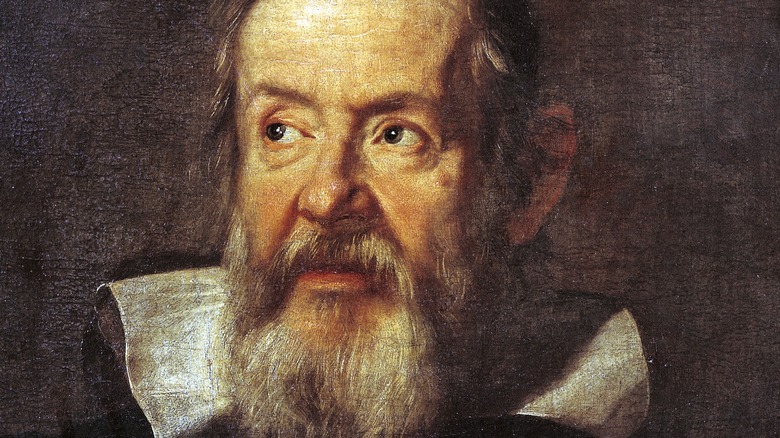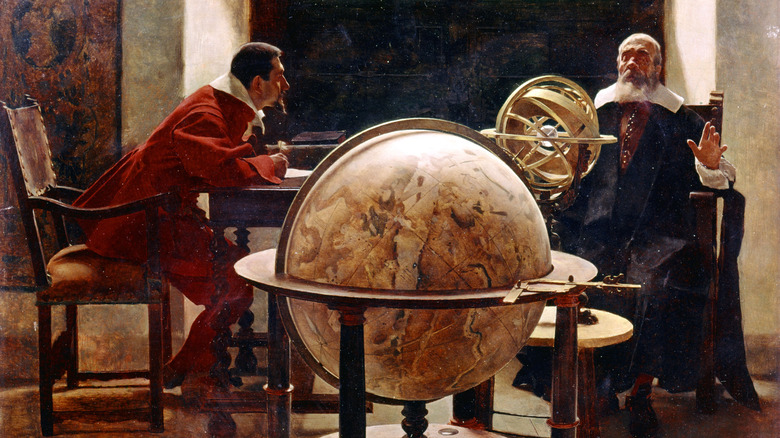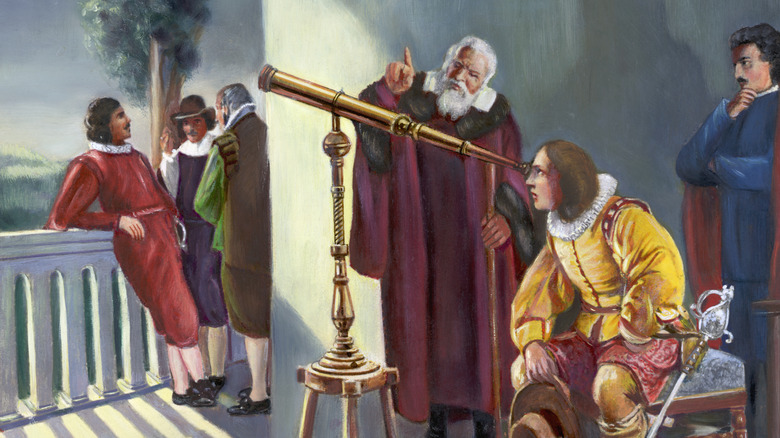Did Groundbreaking Scientist Galileo Galilei Ever Get Married?
Born Galileo di Vincenzo Bonaiuti de' Galilei in 1564, the famous Italian astronomer was also an accomplished physicist and mathematician. He perfected the telescope, invented a number of military compasses, and championed Copernicus' heliocentrism (the Earth revolves around the sun) — a theory that got him in a lot of trouble with the Catholic Church. He was forced to recant in 1633 and eventually ended up on house arrest for heresy and contradicting the Holy Scripture (via History).
Galileo was a well-known, well-respected scientist for most of his life (well, until the Church decided he was a bad guy). After discovering four of Jupiter's moons, he became a bit of a celebrity and a close associate of the powerful Medici family. After the Roman Inquisition forced him into house arrest, he focused the last nine years of his life on writing down his experiments and his theories until his death in 1642.
We don't much about Galileo's private life except that he was the chair of mathematics at the University of Padua for 18 years and that he was always short of money. This was in great part due to family obligations. When his father died in 1591, Galileo became the head of the family and had to help his mother support his five siblings, according to Britannica. This would greatly affect his own decisions about marriage and children later on.
Money and religion affected Galileo's choices in life
Galileo's financial worries might have been behind his decision to never marry. Still, he was a devout Christian, so his choice of never marrying and instead having children out of wedlock is a surprising one. The scientist was 36 when he met Marina Gamba and started a long-term relationship with her. Not much is known about Marina, except that she was born around 1570 and possibly met Galileo in Venice where she lived and he often visited (via Museo Galileo).
The couple eventually had three children — daughters Virginia and Livia, and son Vincenzo — and records suggest the family shared a home in Padua, where Galileo worked as a professor. Galileo is not named as the father in any of the children's baptismal certificates. Their certificates mention "born out of wedlock" and "father unknown" instead. Livia's certificate just has a blank space where the father's name should be.
According to Museo Galileo, it would likely have been unwise for Galileo to admit to fathering children out of wedlock, especially given his tight relationship with the church and the Italian nobility.
The couple went their separate ways after 10 years, when Galileo moved back to Florence in 1610. Surprisingly, he took his two daughters with him but not his four-year-old son, who stayed behind with his mother. Although he never officially recognized his daughters, nine years later he filed a request to legitimize his son. By this time, Marina had passed away for causes unknown.
His children had complicated lives
Galileo certainly didn't have the best opinion of children born out of wedlock, and firmly believed his daughters would never be able to marry well and have a proper social standing. It's also possible that the daughters could have been married into a decent family if Galileo provided large enough dowries, but his income would not have been enough for this. To save them from social discrimination, he sent his daughters — aged 12 and 13 — to the San Mateo Convent, where they both became nuns (per The Galileo Project).
There's no much information on what Livia's life was like in the convent, but Virginia (who took the religious name Maria Celeste) was an avid correspondent. According to The Galileo Project, after Galileo's death, over 100 letters sent by his daughter Virginia were found among his possessions. In these letters, she describes the difficult life at the convent and often asks his father for help to make repairs in the convent. When Galileo was sentenced to house arrest in 1633, part of his sentence included having to recite certain psalms every week for three years. Virginia offered to take over this part of the sentence and do the praying herself. She died of dysentery in 1634 at the age of 33, before she could complete his penance.
After being legitimized, Vincenzo's life became much better. He eventually studied law at Pisa and became a gifted musician, playing lute instruments just as his grandfather had (per Museo Galileo).


